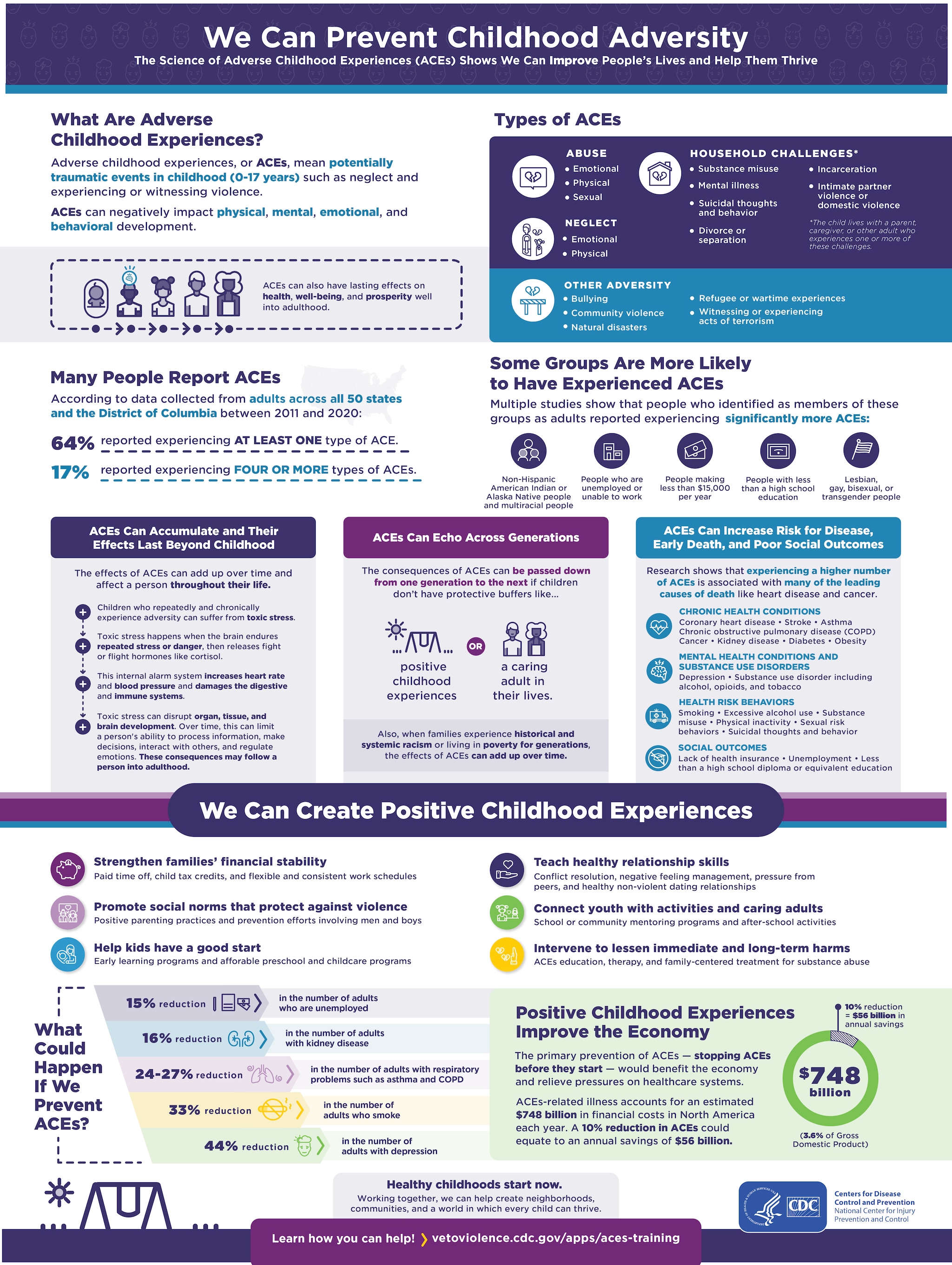We Can Prevent Childhood Adversity

Download full-resolution image of infographic [2 MB]
Download PDF version of infographic [2 MB]
Copy the code below to use the Infographic on your web page or social media page.
We Can Prevent Childhood Adversity
The Science of Adverse Childhood Experiences (ACEs) Shows We Can Improve People’s Lives and Help Them Thrive
What Are Adverse Childhood Experiences?
Adverse childhood experiences, or ACEs, mean potentially traumatic events in childhood (0-17 years) such as neglect and experiencing or witnessing violence.
ACEs can negatively impact physical, mental, emotional, and behavioral development.
ACEs can also have lasting effects on health, well-being, and prosperity well into adulthood.
Types of ACEs
ABUSE
- Emotional
- Physical
- Sexual
NEGLECT
- Emotional
- Physical
HOUSEHOLD CHALLENGES*
- Substance misuse
- Mental illness
- Suicidal thoughts and behavior
- Divorce or separation
- Incarceration
- Intimate partner violence or domestic violence
OTHER ADVERSITY
- Bullying
- Community violence
- Natural disasters
- Refugee or wartime experiences
- Witnessing or experiencing acts of terrorism
*The child lives with a parent, caregiver, or other adult who experiences one or more of these challenges.
Many People Report ACEs
According to data collected from adults across all 50 states and the District of Columbia between 2011 and 2020:
64% reported experiencing AT LEAST ONE type of ACE.
17% reported experiencing FOUR OR MORE types of ACEs.
Some Groups Are More Likely to Have Experienced ACEs
Multiple studies show that people who identified as members of these groups as adults reported experiencing significantly more ACEs:
- Non-Hispanic American Indian or Alaska Native people and multiracial people
- People who are unemployed or unable to work
- People making less than $15,000 per year
- People with less than a high school education
- Lesbian, gay, bisexual, or transgender people
ACEs Can Accumulate and Their Effects Last Beyond Childhood
The effects of ACEs can add up over time and affect a person throughout their life.
- Children who repeatedly and chronically experience adversity can suffer from toxic stress.
- Toxic stress happens when the brain endures repeated stress or danger, then releases fight or flight hormones like cortisol.
- This internal alarm system increases heart rate and blood pressure and damages the digestive and immune systems.
- Toxic stress can disrupt organ, tissue, and brain development. Over time, this can limit a person’s ability to process information, make decisions, interact with others, and regulate emotions. These consequences may follow a person into adulthood.
ACEs Can Echo Across Generations
The consequences of ACEs can be passed down from one generation to the next if children don’t have protective buffers like…
positive childhood experiences or a caring adult in their lives.
Also, when families experience historical and systemic racism or living in poverty for generations, the effects of ACEs can add up over time.
ACEs Can Increase Risk for Disease, Early Death, and Poor Social Outcomes
Research shows that experiencing a higher number of ACEs is associated with many of the leading causes of death like heart disease and cancer.
- CHRONIC HEALTH CONDITIONS
Coronary heart disease, stroke, asthma, chronic obstructive pulmonary disease (COPD), Cancer, kidney disease, diabetes, obesity - MENTAL HEALTH CONDITIONS and SUBSTANCE USE DISORDERS
Depression, substance use disorder including alcohol, opioids, and tobacco - HEALTH RISK BEHAVIORS
Smoking, excessive alcohol use, substance misuse, physical inactivity, sexual risk behaviors, suicidal thoughts and behavior - SOCIAL OUTCOMES
Lack of health insurance, unemployment, less than a high school diploma or equivalent education
We Can Create Positive Childhood Experiences
Strengthen families’ financial stability
Paid time off, child tax credits, and flexible and consistent work schedules
Promote social norms that protect against violence
Positive parenting practices and prevention efforts involving men and boys
Help kids have a good start
Early learning programs and affordable preschool and childcare programs
Teach healthy relationship skills
Conflict resolution, negative feeling management, pressure from peers, and healthy non-violent dating relationships
Connect youth with activities and caring adults
School or community mentoring programs and after-school activities
Intervene to lessen immediate and long-term harms
ACEs education, therapy, and family-centered treatment for substance abuse
What Could Happen If We Prevent ACEs?
15% reduction in the number of adults who are unemployed
16% reduction in the number of adults with kidney disease
24-27% reduction in the number of adults with respiratory problems such as asthma and COPD
33% reduction in the number of adults who smoke
44% reduction in the number of adults with depression
Positive Childhood Experiences Improve the Economy
The primary prevention of ACEs — stopping ACEs before they start — would benefit the economy and relieve pressures on healthcare systems.
ACEs-related illness accounts for an estimated $748 billion in financial costs in North America each year. A 10% reduction in ACEs could equate to an annual savings of $56 billion.
10% reduction= $56 billion in annual savings
$748 billion (3.6% of Gross Domestic Product)
Healthy childhoods start now.
Working together, we can help create neighborhoods, communities, and a world in which every child can thrive.
Centers for Disease Control and Prevention, National Center for Injury Prevention and Control
Learn how you can help! vetoviolence.cdc.gov/apps/aces-training